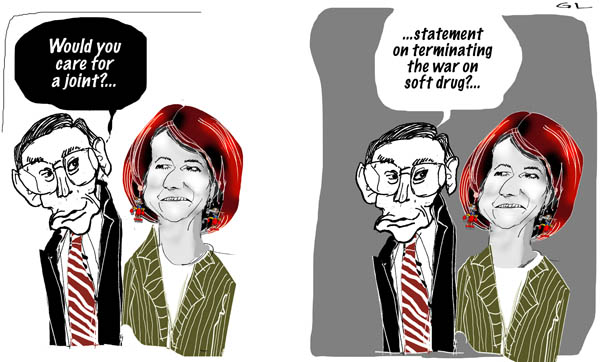Search
Recent comments
- cruelty....
53 min 22 sec ago - japan's gas....
1 hour 33 min ago - peacemonger....
2 hours 30 min ago - see also:
11 hours 31 min ago - calculus....
11 hours 45 min ago - UNAC/UHCP...
16 hours 26 min ago - crafty lingo....
17 hours 50 min ago - off food....
17 hours 59 min ago - lies of empire...
18 hours 58 min ago - no peace....
20 hours 6 min ago
Democracy Links
Member's Off-site Blogs
the end of the war on joints?...

Prime Minister Julia Gillard has rejected the idea of decriminalising narcotics, saying tough policing is necessary instead to prevent the devastating consequences of drug use.
But Ms Gillard's immediate rejection of calls for a rethink of drug laws is at odds with the views of her Foreign Minister, Bob Carr, and those of former police chief Mick Palmer.
Mr Carr called today for a "de facto decriminalisation" of some drugs, as a report declared Australia's "war on drugs" had failed.
And Mr Palmer, a former chief of the Australian Federal Police, said that despite better-resourced and more effective police of recent years, the police effort in the war on drugs had "made only marginal if any difference".
Read more: http://www.smh.com.au/opinion/political-news/gillard-and-carr-divided-over-decriminalisation-of-drugs-20120403-1w9iz.html#ixzz1qx8w8WeZ
- By Gus Leonisky at 3 Apr 2012 - 4:09pm
- Gus Leonisky's blog
- Login or register to post comments
creaming more harms than benefits ...
But the current criminalisation of these drugs, discredited the law which could not possibly stop the growing trade that thrives on illegality and blackmarket status.
Prisons were crowded with people whose lives had been ruined by drug dependence. Like the prohibition of the 1920s in the United States, the laws were creaming more harms than benefits.
Portugal had decrminalised its drug approach a decade ago ''with excellent results'' and a number of other countries had adopted similar approaches.
Read more: http://www.smh.com.au/opinion/political-news/gillard-and-carr-divided-over-decriminalisation-of-drugs-20120403-1w9iz.html#ixzz1qxH4zXU3
drugs on the table...
The Summit of the Americas, normally a subdued tri-annual gathering of regional leaders, could be more interesting than usual this year, as right-wing governments are set to clash with their US allies over the war on drugs.
An increasingly large chorus of nations - ravaged by trafficking and violence - say it's now time to re-think international drug policy. As the corrupting power of cartels grows across Mexico and Central America, and as the body count rises, legalisation needs to be seriously discussed as an alternative to militarisation, regional leaders say.
It isn't a message US President Barack Obama wants to hear when he arrives in Cartagena, Colombia, to meet 33 heads of state on April 14.
"When the word legalisation is uttered, it raises a red flag for the [US] administration," Peter Reuter, a drug policy expert at the University of Maryland, told Al Jazeera.
Legalisation, or decriminalisation, is often associated with liberal activists in North America - the pot smoking, hippy, free-love kind of crowd. Current calls, however, are coming from some of the region’s hardliners.
http://www.aljazeera.com/indepth/features/2012/04/2012413142349136990.html
addiction hell...
When society hates and fears you, what is your interest in observing a law that seems so arbitrary (alcohol is legal) and unjust (addicts are the most vulnerable in the drug supply chain)? Everything has already been lost. What's a criminal conviction to someone whose body is screaming in pain and has nothing further to forfeit?
I'm not expecting pity for heroin addicts, though I believe sympathy, at least, is more useful than revulsion. What I propose is reconsideration of prejudicial legislation that is wrong, no matter that it is based on genuine concern for the wellbeing of society.
Criminalisation of drugs such as heroin simply doesn't make sense. Whether you view drug addiction as illness, affliction, vice, symptom or destiny, my experience was that I never intended to become a heroin addict. Legality wasn't my concern when I was addicted. And my suffering was truly punishment enough, if punishment were even warranted for what is a problem more akin to mental illness than criminal malice.
Read more: http://www.smh.com.au/opinion/politics/take-it-from-an-exaddict-outlawing-drugs-does-not-work-20120524-1z7tb.html#ixzz1vqyfQUly